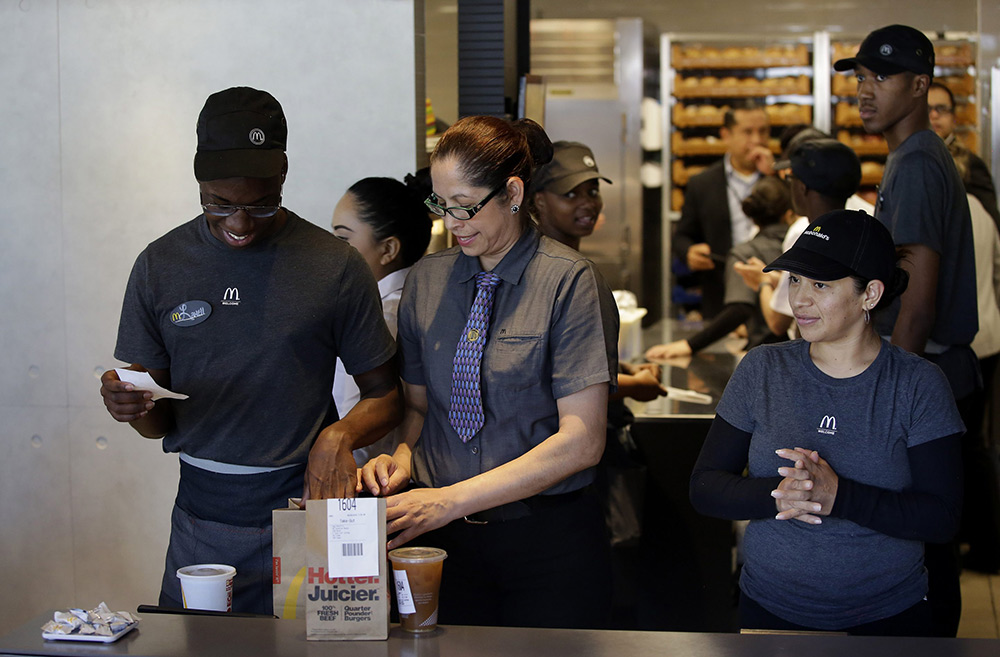
今年年初,,和許多美國人一樣,我找到了一份新工作,。進(jìn)入麥當(dāng)勞美國公司人力資源部門的管理崗位讓我很興奮:我認(rèn)為自己有機(jī)會(huì)對麥當(dāng)勞的業(yè)務(wù)、員工工作以及用戶產(chǎn)生重大影響,。但在看了一些講在麥當(dāng)勞工作的負(fù)面頭條之后,一些同事質(zhì)疑了我的決定,,懷疑我是否能夠?qū)崿F(xiàn)自己的野心:為人們鋪就成功之路。
這種情緒與我成長過程中所認(rèn)識的麥當(dāng)勞并不相符,,麥當(dāng)勞是一個(gè)可以讓人們學(xué)習(xí)到所需技能、促進(jìn)自身職業(yè)發(fā)展的地方,,過去它還贏得了 "美國最好的第一份工作 "的名聲。更重要的是,,如果麥當(dāng)勞的工作有這么多不足,那在今天競爭異常激烈的就業(yè)市場上,,麥當(dāng)勞及其門店為什么還能雇用數(shù)十萬名餐廳員工呢?
我希望理解一下這種認(rèn)知差距,。因此,我的團(tuán)隊(duì)接觸了一家同樣致力于引導(dǎo)人們走上成功職業(yè)道路的組織:美國社區(qū)學(xué)院協(xié)會(huì)(AACC),。2015年,,我們首次與AACC合作創(chuàng)立了“機(jī)會(huì)拱門”項(xiàng)目,為65000多名麥當(dāng)勞員工提供受教育的機(jī)會(huì),,讓他們獲得高中文憑和大學(xué)學(xué)位、學(xué)習(xí)英語,,追求他們的夢想。
今年早些時(shí)候,,我們再次合作進(jìn)行了一項(xiàng)勞動(dòng)力調(diào)查,詢問了近2000名美國人第一份工作的經(jīng)歷,,了解他們在一份工作中最關(guān)心的東西、他們的職業(yè)如何隨著時(shí)間的推移取得進(jìn)步,,以及繼續(xù)教育的價(jià)值。
最后的發(fā)現(xiàn)令人大開眼界,。是的,,受訪者證實(shí)了第一份工作中有競爭力的薪酬和福利的重要性(它也是員工在職業(yè)生涯每個(gè)階段都會(huì)考慮的關(guān)鍵因素)。但他們也表示,,第一份工作能教會(huì)他們的軟技能也很重要,因?yàn)檫@將有助于他們在未來的道路上取得成功,。
軟技能,具體來說就是幫助人們在工作中取得成功的行為,、習(xí)慣和領(lǐng)導(dǎo)特質(zhì)。技術(shù)能力再強(qiáng),、再聰明,,如果人們不能與同事相處,,不能在最后期限前完成任務(wù),也不能聽取反饋意見,,他們的職業(yè)生涯便會(huì)停滯不前,。
LinkedIn發(fā)布的《2019年全球人才趨勢報(bào)告》發(fā)現(xiàn),,近十分之九的招聘人員表示,,缺乏軟技能是導(dǎo)致新員工達(dá)不到要求的原因,這并非偶然,。困難之處在于,技術(shù)性技能(如會(huì)計(jì),、工程或護(hù)理)可以在學(xué)校教授,,但軟技能卻需要通過經(jīng)驗(yàn)來學(xué)習(xí),。
調(diào)查報(bào)告也揭示了員工認(rèn)為第一份工作必須傳授的三類軟技能。首先是責(zé)任心——理解準(zhǔn)時(shí)的重要性,,完成所有工作職責(zé),對結(jié)果負(fù)責(zé),。其次是團(tuán)隊(duì)合作能力——協(xié)作能力,,以及解決問題和有效清晰溝通的技能。第三是良好的應(yīng)對能力——積極傾聽同事或客戶的意見,,保持專注,,迅速行動(dòng)、貫徹到底,,交付有意義的結(jié)果。
調(diào)查還發(fā)現(xiàn),,在第一份工作中從這三類技能中至少學(xué)到一項(xiàng)技能的人,,目前有全職工作的可能性要高出19%,,有醫(yī)療保險(xiǎn)的可能性要高出24%,,認(rèn)為自己對生活和工作感到滿意的可能性要高出50%,。當(dāng)你把在第一份工作中獲得的這些技能與進(jìn)一步教育結(jié)合起來時(shí),積極的結(jié)果會(huì)呈指數(shù)級增長,。有一份不錯(cuò)的第一份工作并獲得了大專文憑的人,從事一份能帶來經(jīng)濟(jì)保障的工作的可能性是其他人的兩倍,,他們對目前工作感到滿意的可能性也是其他人的兩倍多。
理解這些軟技能的長期價(jià)值,,是麥當(dāng)勞作為雇主與眾不同的地方之一。我很高興地得知,,在第一份工作在麥當(dāng)勞的受訪者中,88%的人說他們學(xué)會(huì)了如何開展團(tuán)隊(duì)協(xié)作(相較而言,,美國人明白這一點(diǎn)的總體比例為74%),這也幫助他們之后找到了收入更為穩(wěn)定,、工作滿意度較高的工作,。這些結(jié)果令人鼓舞,,但它也成為了我們進(jìn)步的基礎(chǔ),因此我們還在繼續(xù)推出有利于員工的新項(xiàng)目。
通過在短期內(nèi)提供有競爭力的福利來支持員工,,同時(shí)傳授有利于他們長期在職場上取得成功的技能,雇主可以幫助自己的員工茁壯成長,。這是麥當(dāng)勞將繼續(xù)關(guān)注的領(lǐng)域,,我們希望我們的數(shù)據(jù)也能激勵(lì)其他雇主這樣做,。(財(cái)富中文網(wǎng))
蒂凡妮?博伊德是麥當(dāng)勞美國公司的首席人事官,。
譯者:葛仲君
今年年初,,和許多美國人一樣,,我找到了一份新工作,。進(jìn)入麥當(dāng)勞美國公司人力資源部門的管理崗位讓我很興奮:我認(rèn)為自己有機(jī)會(huì)對麥當(dāng)勞的業(yè)務(wù)、員工工作以及用戶產(chǎn)生重大影響,。但在看了一些講在麥當(dāng)勞工作的負(fù)面頭條之后,一些同事質(zhì)疑了我的決定,,懷疑我是否能夠?qū)崿F(xiàn)自己的野心:為人們鋪就成功之路。
這種情緒與我成長過程中所認(rèn)識的麥當(dāng)勞并不相符,,麥當(dāng)勞是一個(gè)可以讓人們學(xué)習(xí)到所需技能、促進(jìn)自身職業(yè)發(fā)展的地方,,過去它還贏得了 "美國最好的第一份工作 "的名聲。更重要的是,,如果麥當(dāng)勞的工作有這么多不足,,那在今天競爭異常激烈的就業(yè)市場上,,麥當(dāng)勞及其門店為什么還能雇用數(shù)十萬名餐廳員工呢?
我希望理解一下這種認(rèn)知差距,。因此,我的團(tuán)隊(duì)接觸了一家同樣致力于引導(dǎo)人們走上成功職業(yè)道路的組織:美國社區(qū)學(xué)院協(xié)會(huì)(AACC),。2015年,我們首次與AACC合作創(chuàng)立了“機(jī)會(huì)拱門”項(xiàng)目,,為65000多名麥當(dāng)勞員工提供受教育的機(jī)會(huì),讓他們獲得高中文憑和大學(xué)學(xué)位,、學(xué)習(xí)英語,追求他們的夢想。
今年早些時(shí)候,,我們再次合作進(jìn)行了一項(xiàng)勞動(dòng)力調(diào)查,詢問了近2000名美國人第一份工作的經(jīng)歷,,了解他們在一份工作中最關(guān)心的東西、他們的職業(yè)如何隨著時(shí)間的推移取得進(jìn)步,,以及繼續(xù)教育的價(jià)值,。
最后的發(fā)現(xiàn)令人大開眼界。是的,,受訪者證實(shí)了第一份工作中有競爭力的薪酬和福利的重要性(它也是員工在職業(yè)生涯每個(gè)階段都會(huì)考慮的關(guān)鍵因素)。但他們也表示,,第一份工作能教會(huì)他們的軟技能也很重要,因?yàn)檫@將有助于他們在未來的道路上取得成功,。
軟技能,具體來說就是幫助人們在工作中取得成功的行為,、習(xí)慣和領(lǐng)導(dǎo)特質(zhì),。技術(shù)能力再強(qiáng),、再聰明,如果人們不能與同事相處,,不能在最后期限前完成任務(wù),也不能聽取反饋意見,,他們的職業(yè)生涯便會(huì)停滯不前。
LinkedIn發(fā)布的《2019年全球人才趨勢報(bào)告》發(fā)現(xiàn),,近十分之九的招聘人員表示,缺乏軟技能是導(dǎo)致新員工達(dá)不到要求的原因,,這并非偶然,。困難之處在于,,技術(shù)性技能(如會(huì)計(jì),、工程或護(hù)理)可以在學(xué)校教授,,但軟技能卻需要通過經(jīng)驗(yàn)來學(xué)習(xí),。
調(diào)查報(bào)告也揭示了員工認(rèn)為第一份工作必須傳授的三類軟技能,。首先是責(zé)任心——理解準(zhǔn)時(shí)的重要性,,完成所有工作職責(zé),對結(jié)果負(fù)責(zé),。其次是團(tuán)隊(duì)合作能力——協(xié)作能力,以及解決問題和有效清晰溝通的技能,。第三是良好的應(yīng)對能力——積極傾聽同事或客戶的意見,,保持專注,,迅速行動(dòng)、貫徹到底,,交付有意義的結(jié)果。
調(diào)查還發(fā)現(xiàn),,在第一份工作中從這三類技能中至少學(xué)到一項(xiàng)技能的人,目前有全職工作的可能性要高出19%,,有醫(yī)療保險(xiǎn)的可能性要高出24%,,認(rèn)為自己對生活和工作感到滿意的可能性要高出50%,。當(dāng)你把在第一份工作中獲得的這些技能與進(jìn)一步教育結(jié)合起來時(shí),,積極的結(jié)果會(huì)呈指數(shù)級增長。有一份不錯(cuò)的第一份工作并獲得了大專文憑的人,,從事一份能帶來經(jīng)濟(jì)保障的工作的可能性是其他人的兩倍,他們對目前工作感到滿意的可能性也是其他人的兩倍多,。
理解這些軟技能的長期價(jià)值,是麥當(dāng)勞作為雇主與眾不同的地方之一。我很高興地得知,,在第一份工作在麥當(dāng)勞的受訪者中,88%的人說他們學(xué)會(huì)了如何開展團(tuán)隊(duì)協(xié)作(相較而言,,美國人明白這一點(diǎn)的總體比例為74%),這也幫助他們之后找到了收入更為穩(wěn)定,、工作滿意度較高的工作。這些結(jié)果令人鼓舞,,但它也成為了我們進(jìn)步的基礎(chǔ),,因此我們還在繼續(xù)推出有利于員工的新項(xiàng)目。
通過在短期內(nèi)提供有競爭力的福利來支持員工,,同時(shí)傳授有利于他們長期在職場上取得成功的技能,雇主可以幫助自己的員工茁壯成長,。這是麥當(dāng)勞將繼續(xù)關(guān)注的領(lǐng)域,,我們希望我們的數(shù)據(jù)也能激勵(lì)其他雇主這樣做,。(財(cái)富中文網(wǎng))
蒂凡妮?博伊德是麥當(dāng)勞美國公司的首席人事官。
譯者:葛仲君
Earlier this year, like many Americans, I started a new job. Stepping into the top human resources role for McDonald’s USA was exciting: I saw it as an opportunity to have a big impact on the business, on people’s lives, and in the communities McDonald’s serves. But some colleagues questioned my decision after seeing some not-so-favorable headlines about McDonald’s as an employer. They challenged me on whether I would be able to fulfill the ambition that had always driven me: to set people up for successful futures.
That sentiment didn’t fit with the McDonald’s I knew growing up, a place where people could learn the skills they needed to advance and grow in their careers, that eventually earned the reputation of “America’s best first job.” What’s more, if jobs under the Golden Arches were so limiting, how were McDonald’s and its franchisees still able to hire hundreds of thousands of restaurant employees in today’s incredibly competitive job market?
I wanted to understand this perception gap. So my team reached out to an organization that has a shared interest in guiding people along successful career pathways: the American Association of Community Colleges (AACC). We first worked with the AACC in 2015 when we created Archways to Opportunity, a program that has increased access to education for over 65,000 McDonald’s crew members—helping our people earn high school diplomas and college degrees, learn English as a second language, and pursue their dreams.
Earlier this year, we teamed up again on a Workforce Survey that asked nearly 2,000 Americans about their first job experience—about what’s most important to them in a job, how their careers evolved over time, and the value of continued education.
What we found is eye-opening. Yes, survey respondents confirmed the importance of competitive pay and benefits at a first job (a key consideration for employees at every stage of their career). But they also said it was important that a first job teach them soft skills that would help set them up for success down the road.
Soft skills are the behaviors, habits, and leadership traits that help people succeed at work. No matter how deep their technical skills or how bright they are, if they can’t get along with colleagues, make deadlines, or listen to feedback, they’ll find their careers stalled.
It’s no accident that LinkedIn’s Global Talent Trends report found in 2019 that nearly nine in 10 recruiters say a lack of soft skills is what causes a new hire to fall short. The challenge is that while technical skills can be taught in a classroom—think accounting, or engineering, or nursing—soft skills are learned through experience.
The Workforce Survey identified three categories of soft skills that employees believe a first job must teach. First is responsibility—everything from understanding the importance of being on time, to completing all the duties associated with a job, to being accountable for results. Second is teamwork—including skills like collaboration, problem solving, and effective and clear communication. Third is responsiveness—actively listening to colleagues or customers, staying focused, and acting quickly and thoroughly to deliver meaningful results.
The survey also found that people who learned at least one skill from each of these three categories at their first job are 19% more likely to have a full-time job currently, 24% more likely to have health insurance, and 50% more likely to report a feeling of life and job satisfaction. When you pair these skills from first jobs with further education, the positive outcomes grow exponentially. People who had a good first job and earned an associate’s degree are twice as likely to be working at a job that creates financial security, and more than twice as likely to report a current feeling of job satisfaction.
Understanding the long-term value of these soft skills is part of what sets McDonald’s apart as an employer. I was happy to learn that 88% of survey respondents whose first job was at McDonald’s said they learned how to work as part of a team (compared to 74% of Americans overall)—which led to improved financial security and job satisfaction later in life. These results are encouraging, but they're also a benchmark we hope to grow in the future as we continue to introduce new programs that benefit our crew members.
By offering competitive benefits to support employees in the near term, while also teaching the skills that will prepare them for successful careers over the long term, employers can help their people thrive. That’s what McDonald’s will continue to focus on—and we hope this data inspires other employers to do the same.
Tiffanie Boyd is chief people officer of McDonald’s USA.






